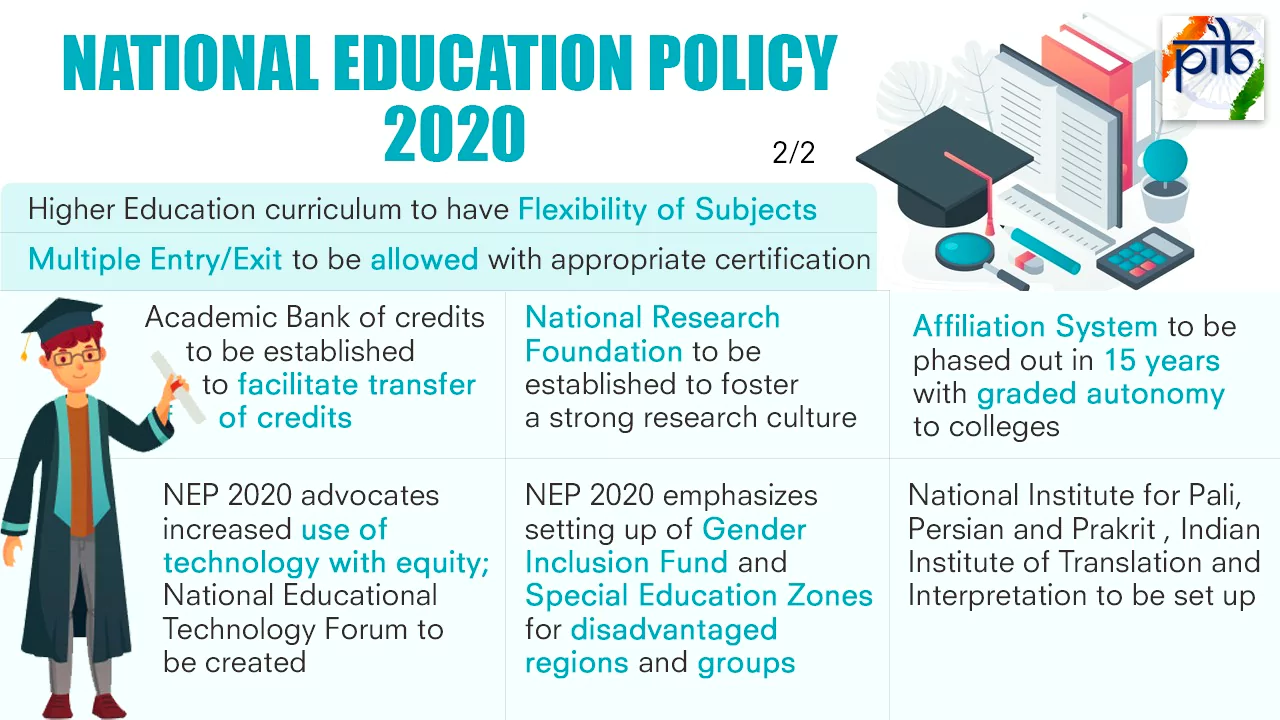Context:
The CBSE is planning significant changes to the academic framework of Classes 9, 10, 11, and 12 as part of its plan to implement a credit system in CBSE, recommended by the National Education Policy 2020.
What Is a Credit System?
The Credit System aims to establish academic equivalence between vocational and general education, facilitating mobility between the two education systems, as proposed by the NEP 2020.
-
- Students earn credits by completing courses or activities.
- To implement this, the University Grants Commission came up with the National Credit Framework (NCrF) in 2022.
- CBSE Implementation: CBSE formed a subcommittee in 2022 to align its academic framework with NCrF.
- The aim is to integrate the credit system into CBSE-affiliated schools.
Also Read: Rethinking India’s Exam-Centric Education System
CBSE: Central Board of Secondary Education
- It is an Autonomous Body set up by the Ministry of Human Resource Development (MHRD), (previously the Ministry of Education).
- Establishment Year: 1929
- It is a national level Board of school education having authority to affiliate schools for school education, conducting the Secondary School Examination and the Senior School Certificate Examination, and award of certificates.
|
Key Details of Proposed Changes By CBSE
- For Class 10: A shift in Class 10 from studying two languages to three, mandating that a minimum of two must be indigenous Indian languages.
- It also suggests that students in Class 10 might now be required to pass in 10 subjects, as opposed to the current necessity of five.
- For Class 12: It entails students studying two languages instead of one, with the condition that at least one must be a native Indian language.
- Students would be expected to clear examinations in six subjects rather than the current requirement of five to successfully complete high school.
- For Academic Year: An academic year is set at 1200 notional learning hours, equivalent to 40 credits.
- Designated time for an average student: Each subject has allocated hours so that, annually, a student accumulates 1200 learning hours for a passing declaration.
- These hours encompass both school-based academic learning and non-academic or experiential learning.
- Digital Storage of Credits: Students’ credits will be digitally stored in the Academic Bank of Credits, accessible through a linked Digilocker account.
National Credit Framework (NCrF)
- National Credit Framework (NCrF) is based on the recommendations from an inter-ministerial committee led by Nirmaljeet Singh Kalsi.
- It includes a set of guidelines for schools, colleges, and universities to embrace the credit system, encompassing the entire school education system.
- In the credit system, the NCrF incorporates credit for activities like sports,arts skill and vocational education.
|
Potential Benefits of National Credit Framework (NCrF)
| S.No. |
Students |
Institutions |
Government |
Industry |
| 1 |
Facilitates multidisciplinary holistic education with flexible curricula |
Promotes stronger collaboration between institutions |
Increased enrolment of students (GER) |
Allows students to attain National Skills Qualification Framework (NSQF)-approved foundational skills developed by industry & be more employable |
| 2 |
Expands core learning to include foundational and cognitive aspects. |
More diversified and rich student’s knowledge base & Increased focus on research and innovation |
Aligns with the demographic dividend, aiming to make India the Skill Capital of the World. |
Provision of Microcredentials allows integration of quick educational upgradation/ up-skilling |
| 3 |
Credits awarded for academic, skill, and experiential learning. |
Simpler and uniform credit mechanism |
Highly educated and trained workforce for Aatmnirbhar Bharat. |
Helps cater to the future demand of skills and bridging skill gap |
| 4 |
Eliminates distinctions between arts, science, and commerce. |
Leveraging of institutional infrastructure |
Making vocational education and training/ skilling aspirational |
Makes students more employable by more holistic design of study by including vocational education and training/ skilling |
National Education Policy 2020
- It is founded on the five guiding pillars of Access, Equity, Quality, Affordability and Accountability. It will prepare our youth to meet the diverse national and global challenges of the present and the future.
- It proposes various reforms in school education as well as higher education including technical education.

Significant Features of National Education Policy 2020
- “5+3+3+4 System”: It introduces a novel 5+3+3+4 framework for school education, dedicating the initial five years to the foundation stage (ages 3–8), followed by the preparatory stage (ages 8–11), middle stage (ages 11–14), and secondary stage (ages 14–18).
- This innovative system aims to establish a robust foundation for students, ensuring they acquire essential skills and knowledge for success in future studies and careers.
- Multilingualism: Multilingualism is underscored in the policy, with an emphasis on teaching students in their mother tongue or regional language during the early years.
- The initiative also encourages the teaching of additional languages, including English and foreign languages..
- Technology-enabled Learning: Places a strong focus on technology-enabled learning, advocating for the integration of technology in education.
- It strives to provide digital infrastructure and connectivity to all schools and colleges, promoting the utilisation of online resources such as e-books, e-learning materials, and online courses.
- Teacher Training: It aims to enhance the quality of teacher education in the country. The emphasis is on equipping teachers with the requisite skills and knowledge to effectively teach in diverse and inclusive classrooms.
- Higher Education: It aspires to revolutionise the landscape by fostering research and innovation, establishing new multidisciplinary institutions, and increasing the Gross Enrolment Ratio (GER) in higher education.
- NEP on Higher Education also talks about Native language, Academic Bank of Credits, Skills & Vocation Education
|
Also Read: Interim Budget 2024-2025
News Source : IE
To get PDF version, Please click on "Print PDF" button.
